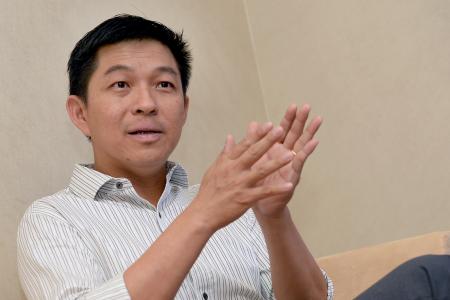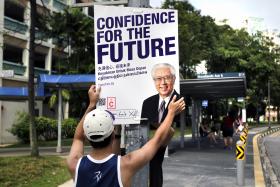Tan Chuan-Jin on...
In a recent interview with The New Paper, Minister for Social and Family Development Tan Chuan-Jin opened up on topics both personal and professional. Here, we present some of his answers in full
Mr Tan on moving from the military to politics:
We think that in the military it’s quite hierarchical. In some sense it is because there’s a hierarchy, there’s a command, structures and all that for the military to function, as with every organisation. But being a national service army, where you have conscripts, you have national servicemen who come back to do their national service duties, ... people will do what they need to do because they’re legally required to.
But they need to go that extra mile, they need to believe in something. You need to believe that the cause is important and necessary. So in order to do that you need to be able to lead. You should not just instruct and command, but how do you inspire, how do you allow individuals to begin to embrace their responsibilities beyond just what they are required to by law, but a passion and the belief that this is important?
So I think in terms of the engagement it’s very similar to what I spend a lot of time doing in the SAF, because you do need to reach out and talk to people at every level.
And in many ways as a public leader today, that’s what I do, and I’ve been actually reaching out to many different groups in different ways.
Mr Tan on his Ministry of Manpower (MOM) experience:
MOM is in many ways a very social ministry. Although you seem to be dealing with manpower as well as economics, it’s a lot more beyond that because it affects everyone’s lives.
How do you look after them in terms of their workplace, safety and health, for example? How do you look after them via the Employment Act to protect them at their workplaces, their rights? How do you ensure that we have a competitive space so that the individuals can be employable?
Jobs and opportunities aren’t about how we contribute to the company. They do, but it’s also about individuals’ livelihood. And I’m acutely aware of the impact of unemployment.
We are in relatively good shape. But I’m always mindful that the data doesn’t really mean anything to the person who’s affected. I always want to qualify that just because it’s 2.9% Singapore citizens being unemployed. You tell that to a person who’s unemployed, he’s like, ‘Yah, but I’m 100% unemployed’.
So it’s also very much about creating jobs and opportunities so that people are able to fulfil their own aspirations. Because there’s a dignity that comes with work, to be able to stand on their own two feet, to be able to provide for themselves and their family. And you need to create an environment for that to happen.
So together with other ministries, coming up with SkillsFuture, to enable that we continue this very aggressive way (in) education and lifelong learning.
Because the world is changing, and if we stop learning and adjusting, you run the risk of being irrelevant. That applies to us as a nation, as an economy, but very much as an individual. So how do we provide the support networks and systems so that individuals can continue on that lifelong learning? It is very much individual responsibility as well. Individuals have to play their part. But how do we support by providing the infrastructure in a way which very few governments do?
So I found that in terms of work, what you do in MOM, the outreach, is quite significant.
People then need to retire. How do you then help to cater to make sure that there is a system, and how do you strengthen it? We do understand people want more flexibility, but with more flexibility, you also have the flip side... Do you then move away from providing for your retirement?
So again, it’s about finding the balance. And I guess it continues on at the ground level as well because by working as an MP on the ground, it allows you to understand issues in a much more intimate way.
Mr Tan on seeing the reality on the ground:
I have an area in Chai Chee where is a bit more lower-income. A lot of rental flats, a range of very complex and different challenges, and literally week in, week out you are thinking of how to help these individuals.
And as you do that, you understand their fairly unique circumstances, and sometimes there are some trends I find.
And that instructs me in my job as a Minister because I know what the challenges are like for some of the lower-income families.
Which is why for example, for the WorkRight campaign, I increased our capacity by ten-fold, for example, to help individuals realise that you are entitled to your CPF contributions, your Workfare contribution.
When you see the individuals grappling with different issues, then you also begin to see how then as a system, how do you also begin to improve, strengthen and adjust the system so that structurally you’re assisting the individuals.
Groundwork allows us to understand better, and for me it has shaped a lot of my own thinking at the broader level. I see the impact of my policies when I tighten manpower. It has a very real impact on companies. It affects real lives. These are not big businesses, these are small businesses which have been in existence for several decades. Small family businesses. They built up something, you know.
But as you try to manage that growth of manpower, invariably it’s tight and some companies are on the brink of collapsing and closing. And it’s not just the economics and finances of that family. It’s the whole emotion of building up something and then seeing it close.
Now it’s important for us to see up close the impact of every policy. Because no policy uniformly benefits everyone exactly the same. There are always pluses and minuses with every policy.
You need to see it in a very unvarnished way so that you begin to realise whether can you nuance your policies. Can there be other measures? So this is where we know that we need to manage the growth of our foreign labour.
But if we believe that there’s something we still need to do and we do believe that that is so, how then do you also assist some of these companies in different ways for them to manage, for them to transit through the most difficult period?
Mr Tan on how the last four years has changed his perspective:
So I would say the last four years have been an insight into some of these things which... as a citizen, were a blur to me.
I didn’t have to go see my MP for any particular issues. But being involved in that way, I realise that it’s a very meaningful way of actually trying to make a difference to people’s lives, and not just low-income families, but middle-class, middle-income families and even those living in better estates.
In that process of interacting and engagement, you pick up concerns, issues, views and that’s where actually it’s not about big government, it’s about an involved government, it’s about engaging and how people play an active part in shaping through these interactions.
I find that quite fulfilling. And I think it allows you to have a deeper sense of how you make a difference to people’s lives in very real ways.
Get The New Paper on your phone with the free TNP app. Download from the Apple App Store or Google Play Store now



